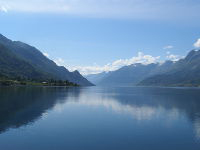Norway is famous for many things – the fjords, two of which feature on the UNESCO world heritage list; the spectacular northern lights that occur between late autumn and early spring; the midnight sun which offers 24 hours of daylight in summer; and winter sports that range from ice skating to cross country skiing. Norway is also successful as an oil-producing and exporting country, and offers its inhabitants a steady job market and high standard of living. For all these reasons, expats have always been drawn to living in Norway. If you’re new to Norway, here are few things you can expect.
An active lifestyle
Norway is a great place for people who love being outdoors and living an active life.Leisure activities are not just reserved for the holidays, but are part of every day life. You can choose from activities such as fishing, camping and hiking. Winters are especially exciting, as many take to the slopes for skiing and sledding. Many workplaces have their own sports teams comprising of employees, and municipalities do their bit to encourage community competitions. The natural landscape in Norway is truly delightful, with its fjords and mountains. Nature lovers are in for a treat each time the landscape changes with every passing season.
Social Benefits
There is an effective social welfare system in place in Norway. Help is at hand in case of illness or unemployment. This is reassuring for people who come from other countries. Medical benefits, unemployment benefits, child benefits, maternity or paternity benefits and pensions are available to all. Pregnant women and children can avail of free medical care, and the health care system is among the best internationally.
Accommodation
The cost of accommodation is high in Norway. This is because housing is required to be of good quality due to the harsh weather. Homes need to have double glass windows to protect the inhabitants from the cold, and good heating systems are a must. To keep the costs of amenities low, the houses tend to be a lot closer to each other, which means that there is very little space for yards. Most residences do not have large gardens or swimming pools. But this practical lifestyle is suitable for the intense winter months and heavy snowfall, and although there may be limited space indoors, you are likely to find lakes, mountains and forests as soon as you step out.
Food
Those used to eating out or living on a fresh food diet may find things a bit expensive in Norway. The best way for an expat to adjust is to eat what the Norwegians eat. Home-cooked meals are common, and one usually finds dishes like stews and soups, potato and carrot dishes, cheaper meats, and open sandwiches in every Norwegian household. Buying seasonal produce also helps to keep the costs low. Berry picking, hunting and fishing are also common in the country.
Working conditions
Employees get a mandatory five-week holiday every year. There are also several public holidays. Working hours are from 8 am to 4 pm. There is a great emphasis on free time and holidays in Norway. In many cases, employers readily provide flexibility when it comes to family matters, such as when parents need to leave work early to pick up their children from school.
Tax system
Taxes are high in Norway because of its comprehensive social welfare system. But the advantage is that the government takes care of all the paperwork and sends you a copy. While for some, it may seem like an invasion of privacy, it can be a big benefit for others. It makes things quite easy for those who are unfamiliar with the systems in the country or those who do not speak the language too well.
Pace of life
Many who come from abroad find that they have more time on their hands when in Norway. This is because life slows down considerably. Regular shops are often shut on Sundays, and so are many bakeries, restaurants and cafes. Stores are open only till 3 pm, while shopping centers close by 8 pm. You can find supermarkets open till about 10 or 11 pm. On Sundays, transport services begin only at 11 am.

